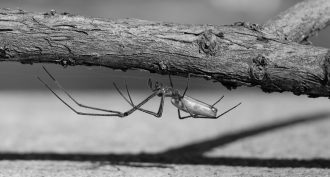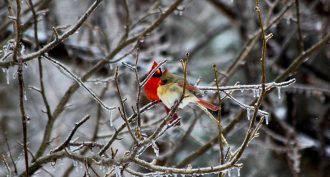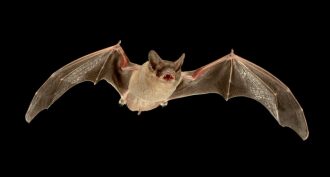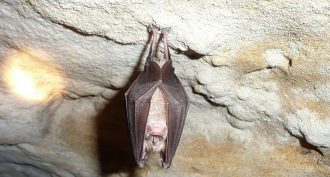Animals
-
 Animals
AnimalsElectric eels get on their prey’s nerves
Electric eels wield remote control over their prey’s muscle movements. They do this by zapping their nervous system. Experiments suggest the creatures use these paralyzing bursts of energy to hunt, too.
-
 Animals
AnimalsA nervy strategy for transplants
Adjusting the electric charges in cells helped a transplanted eye reach out to its new host. The eye grew cells, which help transmit signals to other cells.
-
 Environment
EnvironmentSpidey sense: Eight-legged pollution monitors
Spiders that prey on aquatic insects can serve as sentinels that naturally monitor banned chemicals that still pollute many rivers across the United States.
By Beth Mole -
 Microbes
MicrobesVirus blamed in starfish die-off
A virus may explains the deaths of millions of starfish along the Pacific Coast of North America. The deaths affect 20 species. Some of the stricken animals appear to melt into puddles of slime.
-
 Fossils
FossilsTar pit clues provide ice age news
New analyses of insects and mammals trapped in the La Brea Tar Pits point to climate surprises during the last ice age.
By Sid Perkins -
 Animals
AnimalsTiny — but mighty — food-cleanup crews
Discarded food wastes can turn city spaces into food courts for disease-carrying rats and pigeons. But a new study shows tiny cleanup crews — especially pavement ants — are doing their best to eliminate such wastes. This, in turn, makes cities less attractive to bigger pests.
-
 Animals
AnimalsClimate change brings new neighborhood birds
Climate change has made winters a little bit warmer. Many bird species are now wintering a lot farther north than they did a few decades ago, a new study finds.
-
 Animals
AnimalsCrabs play defense, save corals
In 2008, an outbreak of large starfish killed off much of a coral reef. But some patches were spared. New data point to why: Mini crabs had fended off the big attackers.
-
 Animals
AnimalsBat signals jammed
Mexican free-tailed bats can jam each other’s signals while hunting at night. The interference makes snagging an insect supper even more competitive for the flying mammals.
By Susan Milius -
 Animals
AnimalsScientists seek bat detectives
Bats emit high-pitched calls in the night to find their way around. A citizen science project is eavesdropping on these calls to probe the health of ecosystems.
-
 Animals
AnimalsAncient jellyfish died a strange death
Scientists have probed the fossilized remains of an ancient jellyfish. It reveals a bizarre sequence of events that led to its preservation 310 million years ago.
-
 Earth
EarthWhen life exploded
Life exploded in diversity during the Cambrian Period. Experts are exploring what could account for this sudden change 540 million years ago.
By Beth Geiger